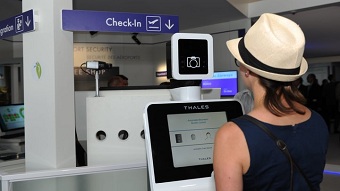The Metropolitan Washington Airports Authority, in partnership with U.S. Customs and Border Protection, unveiled a new biometric screening system Sept. 6, that uses facial-recognition technology to streamline passenger verification and boarding on outbound international flights. The new system, known as veriScan, was designed by the Metropolitan Washington Airports Authority’s Office of Technology in response to a congressional mandate for U.S. Customs and Border Protection (CBP) to implement biometric exit processes for commercial airline flights leaving the United States.
The new system has been successfully tested by airlines serving Washington Dulles International Airport since July, including United Airlines, Air France-KLM and Scandinavian Airlines, and is under review by American Airlines. The veriScan system meets the requirements set forth by CBP for biometric exit procedures at airports and will be available at all international gates at both Dulles International and Ronald Reagan Washington National Airport for airline use by November.
“CBP and our airport and airlines partners are redefining travel by using biometric technology to add convenience, efficiency and security to international arrivals and departures,” said CBP Commissioner Kevin McAleenan. “We have a great partner in the Airports Authority, whose forward-leaning approach to utilizing CBP’s verification system will enable international travelers at Dulles International Airport to experience a frictionless boarding process before the end of the year.”
Using proprietary software loaded on a portable tablet, veriScan encrypts and sends high-resolution photos of passengers boarding international flights to the CBP Traveler Verification Service for nearly instant identity verification. When integrated with airline boarding systems, veriScan will further streamline and expedite the boarding process by eliminating the need for boarding passes.
The entire veriScan screening process takes less than two seconds, helping airlines expedite the boarding process. Unlike other facial recognition systems requiring the installation of large equipment and dedicated communications and electrical lines at each gate, the veriScan system is uses battery-powered, Wi-Fi / cellular connected tablets that are portable and interchangeable among gates. Because of this, veriScan is easy to install, requiring only a 30-minute training before it can be used by airline gate agents, and costs one-tenth that of other commercially available solutions.








